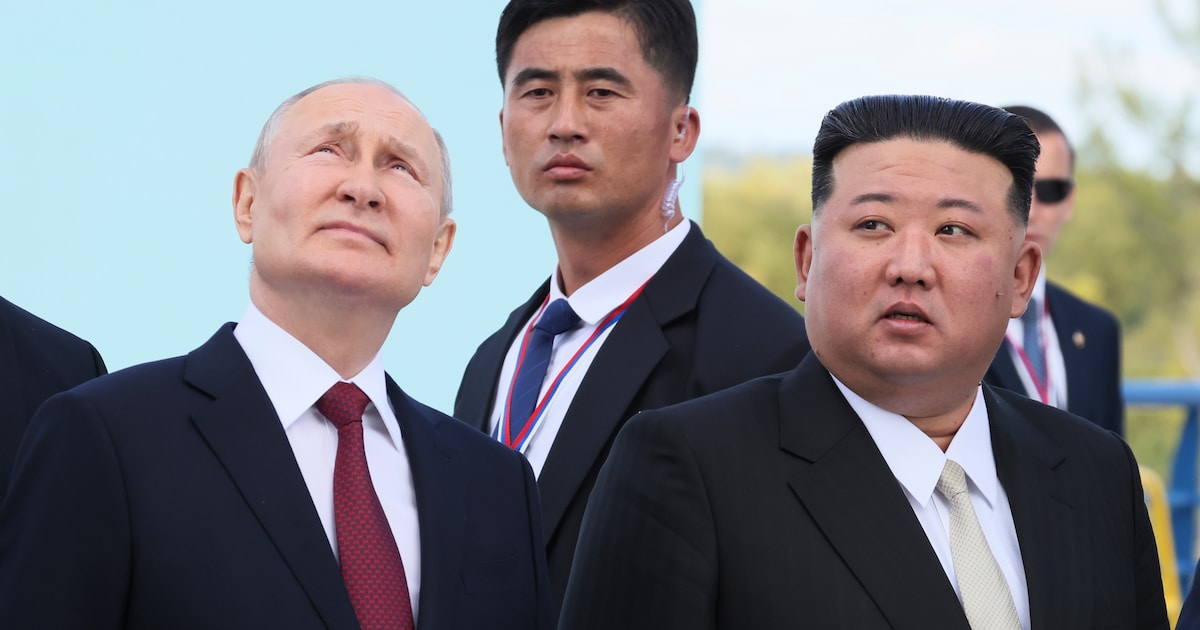
Passenger trains between North Korea and Russia are running again. After a four-year hiatus due to the pandemic, about forty Russian tourists crossed the border last week through the North Korean city of Tumangang. At the beginning of this year, Russian tourists already enjoyed the ski slopes of the neighboring country.
A recent inspection of this rail connection by Russian and North Korean security officials suggests that this route is not limited to tourists. According to the US government, Pyongyang supplies millions of bullets to Russia and North Korean missiles periodically land on Ukrainian battlefields. This train line is useful for transporting weapons. No one knows what North Korea will get in return: it could be oil or food, but also military technology.
About the Author
Marije Vlaskamp is foreign editor of by Volkskrant and writes about China’s position in the world. He also follows developments in other parts of Asia. He was a Beijing correspondent for 18 years.
On the eve of Vladimir Putin’s visit to Pyongyang, the capital of North Korea, there is much speculation about expanded cooperation. For example, according to the Kremlin-affiliated Russian International Affairs Council (RIAC) think tank, tens of thousands of North Korean guest workers could be transported by rail to Russian construction sites.
modern slavery
Now that Moscow needs its men in Ukraine, Russia is desperate for workers. For decades, Pyongyang has been earning foreign currency by sending guest workers abroad: according to renowned North Korea specialist Andrei Lankov, the first work teams went to Russia eighty years ago.
Except for a small amount for the worker, wages go to the state treasury. That is why this employment is characterized as modern slavery. Still, working in North Korea is considered a blessing, Lankov says. Even with a reduced salary, a migrant worker can buy a refrigerator or a television in a few months.
In 2022, Pyongyang was quick to offer pro-Russian separatist leader Denis Pushilin guest workers for the reconstruction of the so-called ‘Donetsk People’s Republic’, the region of eastern Ukraine annexed by Russia. According to websites with contacts between North Koreans, these workers are like North Korea News and Daily NKHe started working in Donetsk in January.
writing on the wall
Pushlin will be concerned that this violates United Nations sanctions imposed over North Korea’s nuclear weapons program. In 2019, all guest workers had to return home. It is not surprising that North Koreans work on construction sites in Donetsk. However, everything is clear if Putin and Kim are preparing to openly employ 20,000 to 50,000 workers.
Under the motto “what is not prohibited is permitted,” Moscow says it respects sanctions against North Korea, but at the same time ostentatiously flirts with collusive cooperation. Depending on the geopolitical situation (read: Western pressure on Russia), Moscow may expand that cooperation. In the most radical scenario, Russia openly defies sanctions and military cooperation is not taboo even in the nuclear field, the RIAC think tank stated on its website. These options will be ‘explored’ in Pyongyang in the coming days.
Whether it is the use of nuclear weapons or cooperation with his North Korean counterpart, Kim Jung-un, Putin is trying to scare the West with both.
Mistrust gets in the way
For Kim, this is a dream scenario, after Moscow abandoned his country following the collapse of the Soviet Union. Starting in the 1990s, Pyongyang ran out of oil and food aid. Horrible famines broke out. In the eyes of North Korea, Russia was a traitor who had turned its back on socialism and its comrades in Pyongyang. North Korea became dependent on China.
Putin appeared in Pyongyang in 2000 as the first Russian leader in history. It was the first of several half-hearted attempts to revive relations.
Almost a quarter of a century later, the cards are completely different. Putin needs Kim. Not only for bullets and missiles, but also for propaganda. Images of cordiality between the two authoritarian leaders, both in possession of a nuclear button, are giving Putin’s Western opponents such a grim feeling that the United States and South Korea are already angry at the prospect of a summit meeting in Pyongyang.
Last September, Putin showed Kim the latest in missile technology. Russia then disbanded a UN panel of experts overseeing the implementation of sanctions against North Korea.
At first glance, Russia and North Korea are perfect partners, united by their hatred of the West, and at times it even appears that an authoritarian triumvirate is brewing with China. However, behind the scenes, deep mistrust between these three countries hinders cooperation.
China avoids escalation
Although images from Pyongyang may give a different impression, Russia and North Korea have a purely transactional relationship. Despite fierce declarations of anti-imperialist camaraderie, Kim knows that her marriage of convenience to Putin will end as soon as Russia can do without him. So Pyongyang is pushed to the margins. Before that happens, Kim takes advantage of the situation.
Putin is worried there will be unrest in Beijing over Russia’s intentions with North Korea, because Chinese leader Xi Jinping is suspicious of both Moscow and Pyongyang and doesn’t like to be left out. However, the Chinese government has barely responded to Russian suggestions of security talks between the three countries or North Korea’s participation in Russian-Chinese military exercises.
China is resisting for all kinds of reasons, but avoiding a new crisis with the United States is the most important thing for China right now.
There is already speculation about a provocative “surprise” by Kim later this year around the US elections. In that scenario, China, currently North Korea’s only formal ally, has little desire to confront Washington.





